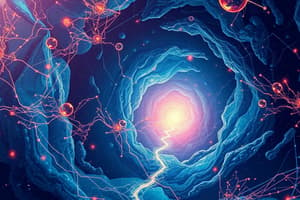Podcast
Questions and Answers
What defines the first stage of the three-stage model of perception?
What defines the first stage of the three-stage model of perception?
- Assigning meaning to perceived objects or events
- Combining sensory data with existing knowledge
- Receiving a stimulus and transmitting it to the brain (correct)
- Interpreting environmental stimuli as coherent images
Which principle is guided by differentiating a figure from its background?
Which principle is guided by differentiating a figure from its background?
- Similarity principle
- Continuity principle
- Figure-ground principle (correct)
- Closure principle
What primarily occurs in the second stage of the perception model?
What primarily occurs in the second stage of the perception model?
- Conversion of stimuli into neural energy
- Identification and interpretation of stimuli
- Transmission of sensory signals to the brain
- Combination of sensory data with existing knowledge (correct)
What is involved in the identification and recognition stage of perception?
What is involved in the identification and recognition stage of perception?
Which of the following is NOT one of the Gestalt principles of perceptual organization?
Which of the following is NOT one of the Gestalt principles of perceptual organization?
Which individual factor can influence perception according to the model?
Which individual factor can influence perception according to the model?
Which principle involves our brain's tendency to fill in gaps to make an image whole?
Which principle involves our brain's tendency to fill in gaps to make an image whole?
What role does pre-existing knowledge play in the perception process?
What role does pre-existing knowledge play in the perception process?
The process of combining sensory data from different senses occurs in which stage?
The process of combining sensory data from different senses occurs in which stage?
How do social factors primarily influence perception?
How do social factors primarily influence perception?
Flashcards
Sensory Processes
Sensory Processes
The process of receiving a stimulus and transforming it into neural energy.
Perceptual Organization
Perceptual Organization
Combining sensory data with prior knowledge to create a coherent understanding.
Figure-Ground Principle
Figure-Ground Principle
The principle that explains how we distinguish an object from its surroundings.
Proximity Principle
Proximity Principle
Signup and view all the flashcards
Similarity Principle
Similarity Principle
Signup and view all the flashcards
Closure Principle
Closure Principle
Signup and view all the flashcards
Continuity Principle
Continuity Principle
Signup and view all the flashcards
Perception (Perzept)
Perception (Perzept)
Signup and view all the flashcards
Recognition
Recognition
Signup and view all the flashcards
Interpretation
Interpretation
Signup and view all the flashcards
Study Notes
Sensory Processes
- Sensory processes involve receiving a stimulus and transmitting it to the brain.
- A stimulus is turned into a physical impulse and then converted into a neural impulse by the brain.
Perceptual Organization
- The brain combines sensory data with existing knowledge, creating a cohesive perception of objects and patterns.
- Sensory data is combined according to Gestalt principles, which describe how humans mentally organize patterns.
Identification and Recognition
- The brain assigns meaning to perceived stimuli, leading to identification or recognition.
- Meaning is derived by matching sensory data to existing knowledge.
Factors Influencing Perception
- Individual Factors: Past experiences, moods, personality traits (e.g., emotions/feelings, attitudes).
- Social Factors: Social values, norms, expectations from others, presence of others.
Studying That Suits You
Use AI to generate personalized quizzes and flashcards to suit your learning preferences.



